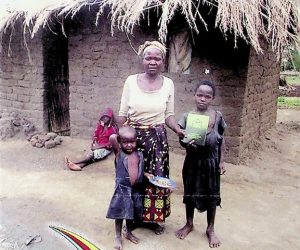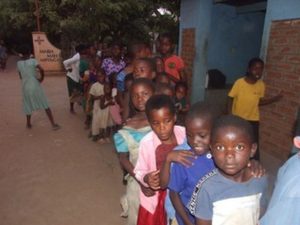Tamtam di fine Aprile 2011
Al termine del primo quadrimestre del 2011 e’ difficile un esame della situazione economica-sociale e politica del Malawi.
I primi mesi sono stati caratterizzati da una crescita di segnali negativi da parte dell’economia che registra in particolare la mancanza di energia elettrica anche per giorni interi, diesel per i trasporti e valuta estera per garantire le importazioni necessarie alla crescita e sviluppo del paese. A questi ormai famosi 3 segnali si e’ aggiunta la chiusura della vendita all’asta del tabacco che da solo copre il 60% delle entrate di tutta l’agricultura del Malawi, e su cui l’economia conta molto.
Ora che inizia l’ultimo trimestre scolastico diventa difficile anche per gli studenti pagare le rette scolastiche. L’universita’ rimane ancora chiusa per la mancanza di una soluzione al confronto tra i professori e la polizia che non accetta di dialogare dopo aver invaso il campus universitario.
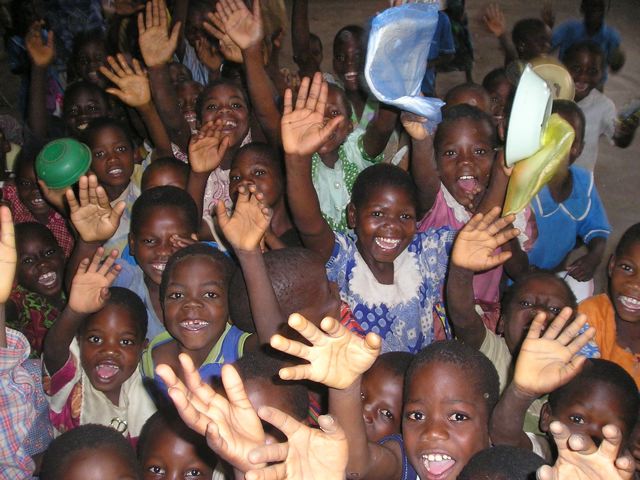
1. Una primavera per il Malawi?
Quello che si temeva e’ proprio avvenuto. Su ordine del presidente della Repubblica, Bingu wa Mutharika, l’High Commissioner/Ambasciatore Britannico Fergus Cochrane-Dyet e’ stato espulso dal Malawi. Un fatto mai capitato all’interno dei paesi del Commonwealth e nei 47 anni dalla fine della presenza coloniale inglese in Malawi. Il motivo e’ stato dato da uno scritto dell’Ambasciatore che bene descriveva lo stato attuale del paese specialmente della sua leadership ormai incontrollabile e lontana dalla democrazia intesa come partecipazione, e finito sui giornali del Malawi.
Dopo giorni di indecisione, l’ordine di abbandonare il paese e’ giunto nonostante i richiami insistenti a fare spazio alla diplomazia. Con la moglie e i tre figli il 46 enne Ambasciatore ha lasciato il Malawi con un discorso che ribadiva il suo desiderio di lavorare per lo sviluppo e la crescita del paese.

Immediata la risposta del Foreign Office Britannico che ha a sua volta espulso la vice Ambasciatore del Malawi a Londra, signora Flossy Gomile Chidyaonga. Una notizia che in occasione delle celebrazioni del Royal Wedding ha ripetuto forte che solo due paesi non erano stati invitati alla festa: la Siria per la repressione in atto e il Malawi. Una fama pericolosa in questo anno di grandi cambiamenti nel continente Africano.
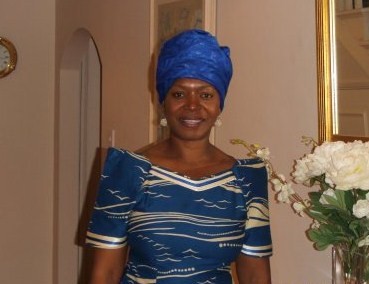
La reazione all’interno del paese e’ diventata un’ondata di proteste da parte della societa’ civile, organizzazioni e tutte le chiese oltre ai partiti dell’opposizione. Il comunicato della Commissione Giustizia e Pace della Chiesa Cattolica fa un’analisi impietosa del cammino intrapreso dal governo che isola il paese e lo avvicina paurosamente all’esperienza dello Zimbabwe ridotto alla fame per anni sotto il pugno di ferro del presidente Gabriel Mugabe, cattolico come Mutharika, e come lui un presidente che non viene dalla politica come arte della ricerca del possibile, e che crede solo a se stesso.
La reazione interna al paese si sta coagulando attorno alla paura che il congelamento degli aiuti dei donors finiranno per colpire pesantemente soprattutto i piu’ poveri. Gli universitari che finora avevano chiesto la liberta’ accademica di insegnamento, ora chiedono apertamente che il presidente lasci la sua carica.
In questa situazione sempre piu’ insistenti sono le voci che il presidente intende cambiare la costituzione per arrogarsi altri cinque anni di governo dopo il 2014. A 77 anni un simile proposito e’ l’inizio di una gerontocrazia che non augura niente di buono e obblighera’ la reazione popolare a non fermarsi.
2. Pirimiti Hospital
Come nulla fosse successo il presidente ha ufficialmente inaugurato il nuovo reparto della maternita’ all’ospedale di Pirimiti nella diocesi di Zomba. I lavori sono stati sostenuti dalla Diocesi di Perugia: l’ospedale offre 112 posti letto.
Il Vescovo di Zomba, Thomas Msusa ha ripetuto la necessita’ di collaborazione e il presidente ha ripetuto che il Malawi puo’ cambiare se governo e altre organizzazioni lavorano assieme: proprio l’opposto di quanto sta accadendo.

3. Joyce Banda – Vice presidente del Malawi
Relegata fuori dal governo, la Vice Presidente e’ stata anche espulsa dal DPP, il partito del presidente Bingu wa Mutharika. Dopo mesi di attesa ha comunicato la formazione del suo nuovo partito il Peoples Party (PP) e della sua struttura interna. Nel suo discorso ha citato il Vangelo e la domanda di Gesu’ ai suoi discepoli di non dormire e vegliare in preghiera. “Dobbiamo stare svegli e pregare Dio per la liberazione”.
Nel nuovo partito vice presidente e’ Khumbo Kachali che viene dal nord del Malawi. Incaricato delle finanze e’ Brown Mpinganjira, molto conosciuto e’ un antico politicante che e’ stato in tutti i partiti e li ha anche lasciati tutti nella sua smania di successo.
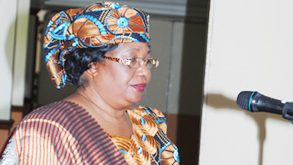
4. Capitolo Generale dei Missionari Monfortani
Il primo maggio inizia a Roma l’incontro generale della famiglia Monfortana. Un momento sempre importante e che vede tra i partecipanti il Bambo Eugenio Cucchi che e’ ritornato dalla Repubblica del Congo

dal Brasile-Peru’ e’ giunto padre Luciano Andreol e cosi’ dal Malawi e’ venuto p. Mario Belotti.
Il TamTam li accompagna nel loro mese di incontri che proporra’ nuove strade alla missione.
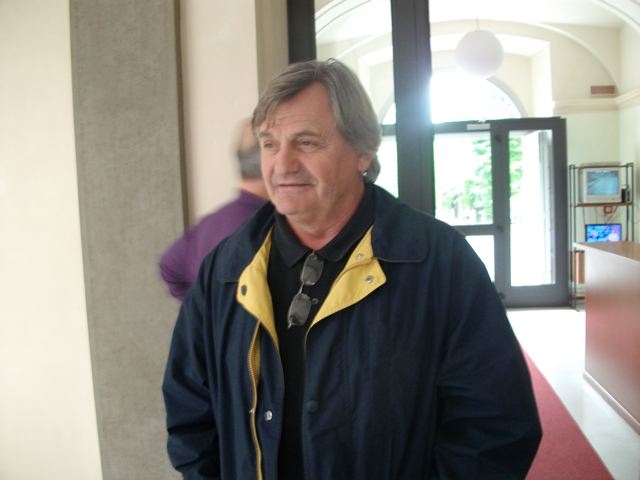
5. Montfort Media
La stamperia del Malawi in questa situazione sociale e politica di grandi attese e paurosi ritorni alla dittatura si ripropone di continuare un impegno a sostegno della democrazia che è l’unica che puo’ dare delle indicazioni che parlino la voce della gente. L’editoriale del The Lamp ripete l’analisi del presente e conferma che il Partito di Governo sta distruggendo se stesso e il paese. (testo a fine pagina).
Sostenere il dibattito pubblico inizia con tanta carta che permetta di scrivere ancora. Non sono tempi facili, il Governo senza l’aiuto dall’esterno continuera’ a indebitarsi e aumentare le tasse su tutto. Recentemente ha iniziato a tassare anche la carta da stampa per giornali e riviste.
Non ci rimane che domandare un aiuto che ci permetta di poter contare su carta e inchiostro, lastre da stampa e ancora carta… E’ un aiuto importante prima che il silenzio impedisca a un paese di sperare in giorni migliori.

un container di carta da stampa… per continuare la Pasqua.
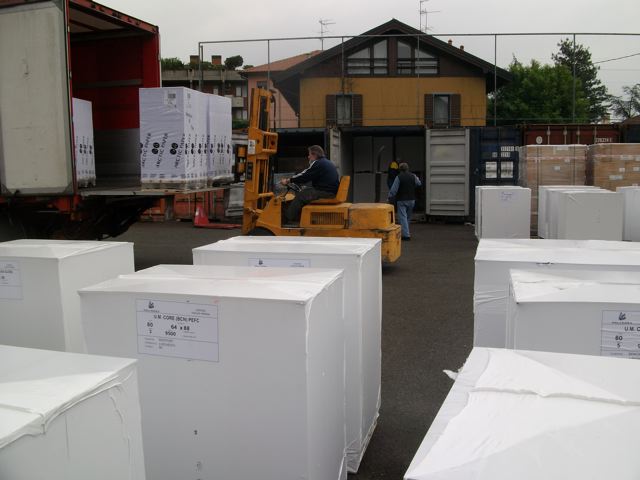
6. Un carissimo saluto a Giorgio Fornoni di Reporter e a p. Santino della redazione dell’Apostolo di Maria
per il loro sostegno e attenzione alle storie dell’Africa e di un Malawi che si merita ben piu’ degli incubi che i suoi politici gli fanno vivere.
Con la sua visita in Malawi nel Maggio 1989, Giovanni Paolo II aveva aiutato il ritorno alla democrazia.
Nel giorno della sua grande festa possa il suo ricordo sostenere la Chiesa e la ricerca costante della giustizia.
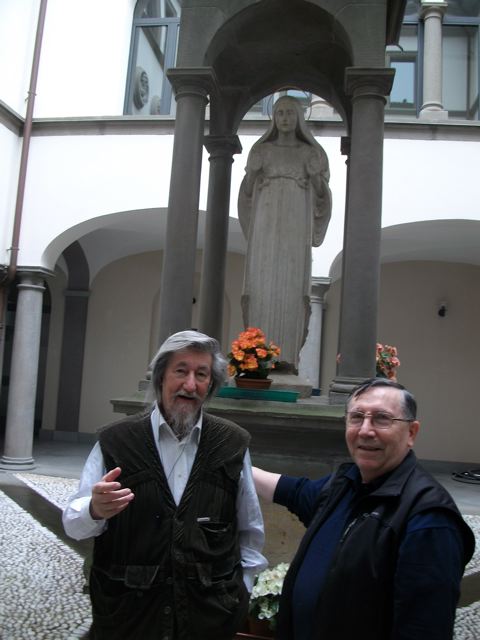
Un Tamtam con tanti punti e tanta ricerca di speranza,
ringrazia per l’attenzione e per credere ancora alla primavera dell’Africa.
ZIKOMO!
=================================================
THE CATHOLIC COMMISSION FOR JUSTICE AND PEACE OF THE EPISCOPAL CONFERENCE OF MALAWI
PRESS STATEMENT
Deportation of the British High Commissioner,
His Excellency Mr. Fergus Cochrane- Dyet – Sign of the Times
Preamble
The Catholic Commission for Justice and Peace (CCJP) of the Episcopal Conference of Malawi, in the spirit of the October 2010 Pastoral Statement of the Episcopal Conference of Malawi, is issuing this statement to reflect on the current economic, governance and human rights challenges the country is facing. We do so concerned by the ever widening gap between the government, on the one hand, and the civil society, faith-based organizations, the private media, the academia and the diplomatic community, the general Malawian citizenry, on the other hand. We note with concern the ever growing list of griefs and anguishes of the people of Malawi ever since the Pastoral Statement was issued some six months ago. These include the ever-recurring scarcity of fuel, the forex crisis, the plight of civil servants with the current salary delays, the Press Freedom Section 46 saga, the limitations freedom to demonstrate, the row over academic freedom, the ever narrowing space for the participation of Civil Society, the space for diplomatic missions. Of immediate concern for us and which is the subject matter for the bulk of this Statement is the issuance of a deportation order to the British High Commissioner, His Excellency Mr. Fergus Cochrane -Dyet by the Malawi Government.
Deportation order to the British High Commissioner, His Excellency, Mr. Fergus Cochrane- Dyet
We have noted with sadness that despite the wide public outcry not to proceed with deportation of His Excellency Mr. Fergus Cochrane- Dyet, our government, expected to be the government of the people, by the people and for the people, has gone ahead to implement this unpopular and contested action.
The facts leading to the issuance of the deportation order of the British High Commissioner due to the contents of the leaked cable on the worsening governance and human rights trends in Malawi while they are of critical significance to the nation and to the Malawi Government leadership in particular; imply the following:
1. A continued lack of tolerance and acceptance of objective or any criticism by Government and its state apparatus;
2. A continued unwillingness to listen to public outcries on national issues by Government leadership.
3. Limited space for constructive dialogue between Government and other stakeholders like Civil Society Organizations, including the Diplomatic Community on governance issues
The Catholic Commission for Justice and Peace is worried that this action taken by the Malawi Government leadership may have serious implications on Malawi peoples’ livelihoods, if the recent communication from the British Foreign Office is anything to go by. This is because:
1. The British Government has been hugely supporting the health sector, the agricultural sector, direct budget support, governance and justice sector and Non Governmental Organizations, Civil Society Organizations, and Faith Based Organizations in Malawi and that any negative response or reaction from the British in a similar manner, will cripple Malawi’s economy and developmental strides.
2. This action and the subsequent reaction of the British Government will have negative repercussions on the same pro-poor development needs that the Government of Malawi with the assistance from donors champions. These include Farm input subsidy program, food security programs, access to primary justice program, capacity building of the judicial services and clearing of criminal cases backlog in Malawi court and prison systems.
3. Furthermore, this action has surely sent shockwaves and feelings of uncertainty to Malawi as a nation, and to Malawi’s development cooperating partners. The international community may not be sure as to what next action the Government of Malawi would take to curb criticism however well founded it could be. In the long run, the national and international image of Malawi towards attracting development support may be greatly compromised in so doing slowing down processes of economic development in Malawi.
Our Appeal
While appreciating that the Government (Malawi) has a right to protect its interests under the banner of national sovereignty; and also taking cognizance of the fact that bilateral relationships between nations have international guidelines allowing for open and democratic interstate collaboration, we in CCJP, feel that the circumstances surrounding the leaked cable and the subsequent reaction from both the Government of Malawi and the British Government could have been better managed to allow room for possible alternatives in the name of dialogue, arbitration and remonstration.
Ever conscious of the genuine common good of Malawians, we make the following passionate appeal:
1. To the British Government, we in CCJP kindly appeal to you not to react in a completely negative and retrogressive way or manner. We are speaking as one of the important stakeholders on governance issues in Malawi; believing that Malawi at this point in time, cannot adequately satisfy its developmental needs without your technical and financial support to eliminate its three enemies of hunger, diseases and poverty.
1. To the Wider Diplomatic Community and Developmental Partners, we would like to remind you that a friend in need is a friend in deed. We are appealing to your continued support to Malawi so that the majority poor and under-privileged do not remain trapped in abject poverty. We also implore you to steadfastly work with Malawi government, Civil Society Organizations, Faith Based Organizations and many other structures to allow Malawi to attain the Millennium Development Goals while at the same time keeping constant dialogue with Malawi on all critical social development issues.
1. To the Malawi Government Leadership, we seriously appeal to you to work towards building bridges of dialogue (intra-state and inter-state) and effective international cooperation, using constructive engagement towards the socio-economic and political development of the Malawi nation. More efforts should be put into listening, seeking amicable solutions to national and international differences so that there is a peaceful and just resolution to all differences that have arisen and those that may arise. We pray for Malawi Leadership not to throw away all the opportunities offered through the British Government support that has enabled Malawians to make meaningful strides towards their socio-economic empowerment.
Conclusion
In conclusion, CCJP is issuing this statement with a patriotic zeal that it has and seeks in solidarity with the general Malawian citizen and the wider diplomatic community to express our dissatisfaction and sadness on this issue of His Excellency Mr. Fergus Cochrane -Dyet. We make our own the wish of the Bishops in their 31st October 2010 Pastoral Statement, “Reading the signs of the Times”, that a new era may be ushered “characterized by honest and respectful dialogue and an ardent common search for solutions towards the integral development of Malawi”.
Chris Chisoni
National Secretary – Catholic Commission for Justice and Peace Fr. George Buleya
Secretary General – Episcopal Conference of Malawi Date: 28 APRIL 2011
========
The Lamp editorial
POLITICAL REALISM: AN IMPORTANT ANGLE OF VISION
We have celebrated Easter amidst yet many debatable topics from the dying DPP which have actually confirmed The Lamp’s long awaited social verdict that this party has indeed decided to kill itself due to its pride and greed for absolute power which have affected its own perception of democracy, governance and social security.
The most worrisome of all are three topics: first, government failure to handle the standoff with University of Malawi lecturers on academic freedom especially Chancellor College; second, the rumour that the DPP has planned a bid for President Bingu wa Mutharika’s third term; third, the insanity of the government’s decision to expel the British High Commissioner to Malawi, Mr. Fergus Cochrane-Dyet, on grounds that his leaked diplomatic communiqué angered the State president.
The Lamp finds all these developments unfortunate for any Malawian even in rural areas and on grassroots level such as Chiyendausiku and Golomoti see that the bottom line is the DPP’s refusing to listen and change way of managing this country. And history has taught us that such behavior is not uncommon in Africa especially when a democratic state is becoming an anarchical society, or when a president has failed to groom a credible successor.
On the Prince’s obligations
Does it make sense to expel a diplomat simply because he reported a true perception to his boss? Even though unpopular, Machiavelli’s political philosophy upholds that power and deception are the two essential means for conduct of foreign policy. Though he acknowledged that the supreme political value is national autonomy, practical wisdom taught him that the main responsibility of any ruler must be seeking the advantages of his people and defending the interests of the nation so that it may survive (1984:56-59):
A prince … cannot observe all those things for which men are considered good, for in order to maintain the state he is often obliged to act against his promise, against charity, against humanity, and against religion. It is therefore necessary that he have a mind ready to turn itself according to the way the winds of fortune and changeability of political affairs require… As long as it is possible, he should not astray from the good, but he should know how to enter into evil when necessity commands.
Indeed, Focus in this issue is taking the DPP to task on the recent ambiguity as regards national security and constitutionalism.
The statecraft
Even though Socrates preferred to be a hungry man with all dignity than a pig satisfied, Datiri (2006) noted that often times in African politics, “immaturity makes us unable to handle difference of opinion constructively.” In the case of Malawi, this immaturity of few individuals in international relations is yet to cause not only wounds among international partners such as the European Union and the United States but even a lot of suffering on Malawi’s grassroots level.
Malawi ought to be on guard to maintain unity with the international community not only because they are key donors but by virtue of them being equal partners in national development. This is an issue of political economy – a type that requires the strength of the lion and the cunning of the fox, as Machiavelli put it. In other words, if our political leaders are not as astute as Ngwazi Dr Kamuzu Banda who learnt how to be crafty and adroit even though dictator, the DPP is making Malawi miss an opportunity that could bring the country to great advantages. If not guarded against by Malawians themselves, this trend might destroy all the national achievements attained in the DPP regime’s first term of office.
Malawi’ security dilemma
Thomas Hobbes believed that in any security dilemma whereby national survival is at risk, no political leader must be confident about his or her security and survival alone. The desirable and urgent thing that must be sought by is simply the nation’s escape from the danger. This can only be achieved through attainment of a civilized human condition which is only created and maintained by the sovereign state. However, to create this civilized human condition, the DPP leadership ought to transform its fear and insecurity into a joint collaboration of all men and women in the country who are in one way or the other beginning to experience fear and insecurity due to the acts of the government that they themselves had unfortunately voted into power.
Sovereignty by reason not emotion
Though a sovereign state, Malawi is far from achieving economic and political sovereignty because it need international to run our budget. This requires maturity in politics not Mugabe’s arrogance that ruined the then vibrant Zimbabwe. The fear and insecurity now reigning in the DPP have certainly driven the party away from sanity. As Thomas Hobbes would put it, the ‘natural condition of warring’ guided by passion and emotion, only creates a state with an intelligent sovereign government that possesses absolute authority and credible power as guided by corporate wisdom but political immaturity. It means that the only escape route for the DPP is to humble itself and turn away from viewing the civil society, opposition parties, Catholic bishops, and diplomats as enemies into making them partners for joint collaboration. This is what can guarantee Malawi political and economic security.
Malawi’s way forward: strategic realism
We can conclude as experts said that power must not be understood to be only a fact of individuals’ political life and ambitions but a matter of political responsibility (Jackson and Sorensen, 2007). Even though many African leaders today do care less about their relations with the opposition, Churches and Western donor countries because of their relations with China, a contextual assessment of the realist doctrine as regards Malawi’s sovereignty as an internal society, and all the emancipatory suggestions so far, must be brought to the attention of the DPP leadership. As a nation in international relationships, the DPP is not dealing with Taiwan or Libya anymore but Malawians as supported by the British government, European Union and many other stakeholders.
